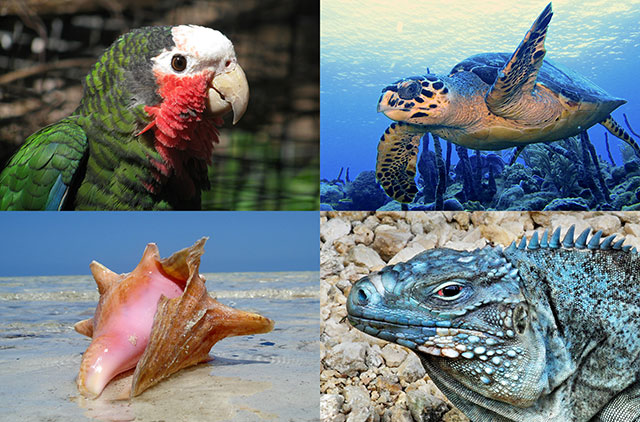
A Talk on the Wild Side.
 Clockwise from top left, photo credits in parentheses: Cuban Amazon (Donar Reiskoffer), hawksbill sea turtle (Sylvain Corbel), queen conch (Sean Nash), blue iguana (Don Taylor). All images available under a Creative Commons license.
Clockwise from top left, photo credits in parentheses: Cuban Amazon (Donar Reiskoffer), hawksbill sea turtle (Sylvain Corbel), queen conch (Sean Nash), blue iguana (Don Taylor). All images available under a Creative Commons license.
Good news in the Caribbean’s fight against wildlife trafficking, reports Bruce Weissgold, a Senior CITES Specialist for the U.S. Fish and Wildlife Service who has worked on policy issues extensively in the Caribbean, particularly related to iguana conservation and wildlife trafficking.
Wildlife trafficking in the Caribbean threatens such celebrated species as parrots and macaws, critically endangered rock iguanas, marine turtles, corals, and the highly valued queen conch and spiny lobster. In response, 11 Caribbean countries including the United States, conservation groups and intergovernmental organizations came together last month to increase cooperation to combat wildlife trafficking in the region.
The participating countries recommended forming a cooperative Caribbean Wildlife Enforcement Network – a CaribWEN - to increase information sharing, provide a platform for capacity building and training, improve capacity for criminal investigations, and manage law enforcement operations and border inspections. A CaribWEN could also raise awareness about the problem of wildlife trafficking among the people of the Caribbean and its governments, as well as tourists.
Similar networks exist in Southeast Asia, Central America, Africa, and the European Union. They can provide insight and models to help guide best practices for a CaribWEN.
The Caribbean is a region of exceptional biodiversity, with many species found only on a single island, and it is threatened by illegal and unsustainable harvest and trade of at-risk species. Wildlife trafficked from the Caribbean to high-demand markets around the globe is sold as food (the Queen conch, shark fins, sea turtle meat and spiny lobster), jewelry (coral), souvenirs (sea turtle shells) and pets (iguanas, snakes and parrots). As drug- and human-smuggling continue in the region, so does wildlife trafficking.
Transnational criminals in the Caribbean are involved in the trafficking of local wildlife as well as the smuggling of protected wildlife from Central and South America through Caribbean nations to markets in China, Europe and the United States. Countries in the region face significant challenges patrolling vast coastlines, screening a large volume of people departing the region by air and cruise ship, as well as inspecting a large volume of air and ocean cargo originating and moving through the region.
Additionally, tourists - most from the United States - often unwittingly purchase protected native wildlife at roadside stands or souvenir shops, and then try to bring the item home. Tips for travelers can be found in our buyer beware brochure.
 Photo by Neil Gardner/USFWS
Photo by Neil Gardner/USFWS
The recommendations of the workshop participants and their public outcomes statement will be presented to the Second Global Meeting of Wildlife Enforcement Networks to be held during this fall’s Conference of the Parties to the Convention on International Trade in Endangered Species of Wild Fauna and Flora (CITES). The countries that participated in the workshop were the Bahamas, Barbados, Belize, Cuba, Dominican Republic, Haiti, Jamaica, St. Kitts and Nevis, St. Lucia, Trinidad and Tobago and the United States.
Through our offices of International Affairs and Law Enforcement, the U.S. Fish and Wildlife Service will continue to work with meeting participants, other organizations and donors and U.S. federal agencies to develop a CaribWEN and make it operational. We are also working with partners including JetBlue and the U.S. Wildlife Trafficking Alliance to encourage Caribbean residents and visitors to be informed and buy informed so they do not contribute to illegal wildlife trade.
The workshop was organized by the Wildlife and Forest Crime program of the U.N. Office on Drugs and Crime, the CITES Secretariat, the U.S. Fish and Wildlife Service, the National Oceanic and Atmospheric Administration and the U.S. Department of State. Funding was provided by the U.S. Department of State, the European Union and the government of the Bahamas.
Is there no process for citizen input to this proposal for an enforcement network, which would seem to have capabilities that match or even exceed regional drug interdiction activities? At the least, could citizens/residents of the eleven participating states be informed of their individual national points-of-contact to express their suggestions through their separate national government structures?